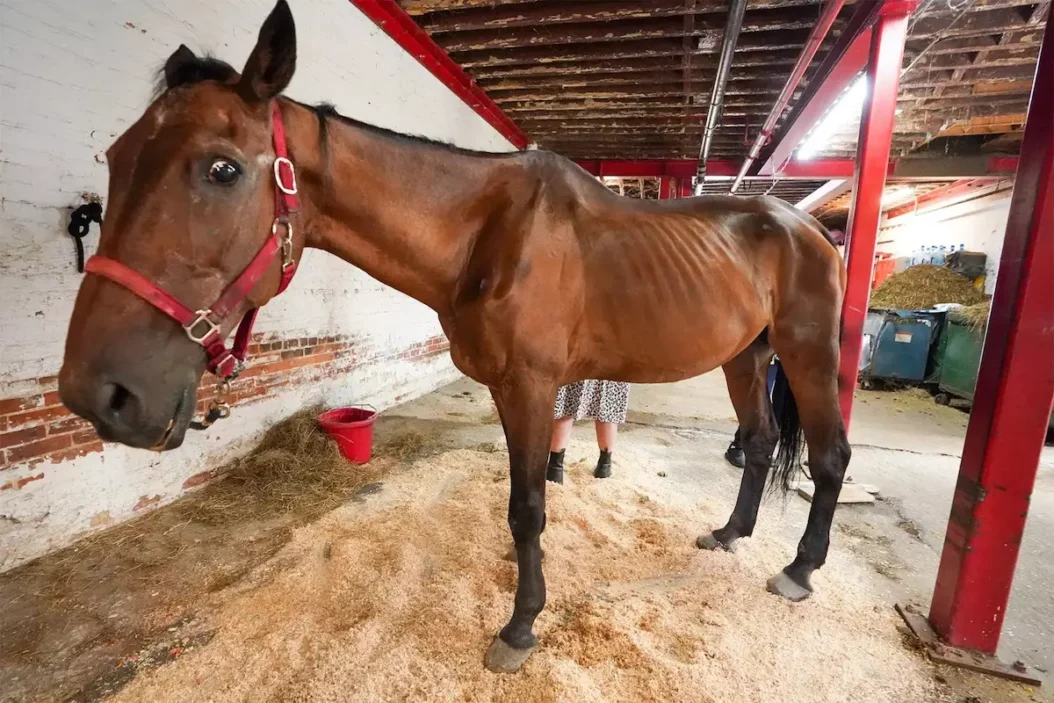Euthanasia of famed NYC carriage horse completes tragic saga of abuse and neglect, calling entire industry into further shame
New York – As New York City mourns the loss of Ryder, a beloved carriage horse, with a public protest today of his alleged abuse and death, leaders from two animal groups are expressing deep sadness and outrage that his previous owner, Colm McKeever, has to attend his public hearing.
McKeever, who is charged with falsifying birth records and making false statements related to Ryder’s age and health, skipped his public hearing last month.
Just this week, Animal Wellness Action and the Center for a Humane Economy received documents as a result of their open-records request. The records, provided by The New York City Department of Health, show a history of reckless lack of oversight by the agency overseeing the horse carriage industry.

Ryder’s latest veterinary certificate clearing the horse for service, filled out on April 19, 2022, contained inconsistent and incomplete information regarding the horse’s age, with one page listing his age as “1999,” while another page in the same form stated that the horse was 13 years old with a birth date of 01/01 but with the year left blank. The same file contains a rabies vaccination certificate dated April 19, 2022, that indicates a 1999 birth year, making Ryder at least 10 years older than represented in the horse-license application.
Despite these glaring contradictions, the Department of Health rubberstamped Ryder’s horse carriage license eight days after the medical examination.
Seeing these records firsthand confirms what the Center for a Humane Economy and Animal Wellness Action’s director of veterinary services Jim Keen believed to be true after seeing Ryder collapse: Ryder was too old and too frail to be pulling an 1,800-pound load in the summer heat.
On Aug. 10, 2022, the bay gelding was pulling a carriage in smothering conditions when he fell twice. The second time it took more than an hour, with cool water sprayed onto his body from a policeman’s hose, for him to rise. Video shows the driver of this bone-thin and exhausted working animal yelling at his immobile body to “get up” and hitting him with the reins.
“Ryder appeared too old and too unhealthy to pull a one-ton load and to navigate New York’s car-choked streets,” said Dr. Keen, an agricultural veterinarian. “If the industry puts horses in that kind of condition to work, it must have no animal-care screening whatever.” Ryder died just two months after he went down on a city street.
After Ryder’s fall, Keen immediately conducted a professional assessment of Ryder and determined that the horse had to be much older than 13 years. Documentation in hand confirms this to be the case.
The New York City Health Department has since charged his owner, Ian McKeever, and his brother, Colm McKeever, for allegedly falsifying veterinary records. Apparently, Colm McKeever faced a September hearing but failed to show up. The date has yet to be rescheduled.
A Covert Move
Center for a Humane Economy and Animal Wellness Action continue to call out all of those involved in Ryder’s cover-up and untimely death, including Transport Workers Union Local 100 for its refusal to put animal welfare first and to keep the public informed. The Union has steadfastly stood in support of the carriage horse industry, and reported to the press subsequent to the incident that Ryder was fine and having a good life at an undisclosed upstate New York farm.
Personnel from the animal groups eventually learned that Ryder had been moved to a for-profit farm that continues to enthusiastically support the carriage horse industry with its social media and public events. Results of Ryder’s veterinary exams, if they occurred at all, were not released to the public.
More of the Same
Ryder’s story is not unlike other working horses today who are forced to pull tourists in carriages or stand on pavement and wait for the next rider, sometimes for hours at a time. Before he was conscripted into this industry, he was a race horse who earned $20,000 in winnings for his owners.
The health and wellbeing of today’s 160 licensed working horses are still at risk, and Animal Wellness Action and the Center for a Humane Economy support city legislation to phase out the use of horses and to replace them with beautifully designed, safe electric carriages.
The Center’s National Law Enforcement Council will continue to press the District Attorney Alvin Bragg to take animal cruelty seriously with harsh penalties in the case of Ryder and all cruelty to carriage horses within his jurisdiction.
“How many incidents, how many deaths do we need to punctuate the case that this is an inhumane, irresponsible industry?” added Wayne Pacelle, president of the Center for a Humane Economy. “These incidents will recur again and again because this industry conscripts broken-down horses, overworks them, and puts them on dangerous, overcrowded city streets.”

